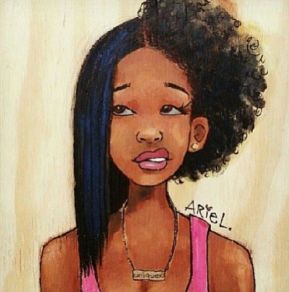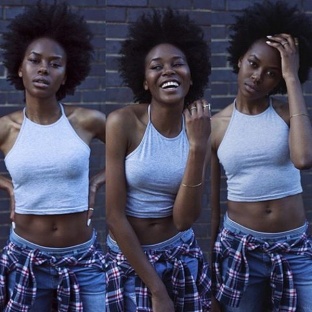Hair!!
Adichie has stated that she had to keep herself from making the book about natural hair.

It says a lot then that the story starts out with Ifemelu on her way to the hair salon to get braids. Even before she gets there though, we get that hair is one of the ways she assesses people (the balding man at the train station, the dreadlocked white man…)
Ifemelu has natural hair and the exchange she has with the braider reveals that it’s more than just aesthetics.
***************

“She touched Ifemelu’s hair. “Why you don’t have relaxer?” “I like my hair the way God made it.”
“But how you comb it? Hard to comb,” Aisha said.
Ifemelu had brought her comb. She gently combed her hair, dense, soft, and tightly coiled, until it framed her head like a halo. “It’s not hard to comb if you moisturize it properly,” she said, slipping into the coaxing tone of the proselytizer that she used whenever she was trying to convince other black women about the merits of wearing their hair natural. Aisha snorted; she clearly could not understand why anybody would choose to suffer through combing natural hair, instead of simply relaxing. She sectioned out Ifemelu’s hair, plucked a little attachment from the pile on the table, and began deftly to twist. pg. 15
******************
Ifemelu and the women braiders are all African immigrants, yet there is a stark difference between them. Ifemelu’s “hair consciousness” seems to align her with the Black consciousness politics of “American Blacks” who are the focus of her blog. Yes, there are American Blacks who are not on the natural hair band wagon and Ifemelu would likely preach the merits of natural hair to them also and there are many African immigrants who wear natural hair that she would gladly throw a high-five.
What’s intriguing about this exchange at the salon then is that it prompts the question:
How is Ifemelu’s journey in Diaspora different from the women at the braid salon, shaping her identity? Do African immigrants become less African and more Black?
If you have natural hair, how do you relate to Ifemelu’s experience at the salon and having to defend your hair choice?
Why did you decide to go natural or not? Is it really that political (serious)?
Let’s dig in!!!

Photos from: https://onmogul.com/stories/getting-kinky-my-journey-to-natural-hair, http://www.hergivenhair.com/blog/tag/natural-hair-gurus/, https://plus.google.com/114110309672748059220

Hello readers, I was fortunate to start a conversation with another passenger on the red line train ( CTA train In Chicago) this afternoon. i initiated a conversation about natural hair because i fancy her Afro. Then a question of whether natural hair makes you more African than you already are came up. My co-passenger response was thrilling as she responded in her African American accent “gal, that so-called overrated creamy chemical be damaging my thing, coulda start growing natural a long time” and her distaste for relaxer reminded me of similar comment one of my friend wrote on her Facebook wall: “you see how much it grew after 2 yrs! we coulda been great together….(natural hair seen as accomplishment) with our fros…. ”
Another friend (male) think natural hair is the shit-nit, and he frankly said that kinky can never be straight!
I choose to perm my hair because It more convenient to style which am beginning to think it a lame excuse, because i now see natural hair as beauty given us from above.
Kindly share your experience with choosing natural and not.
we have more gist coming about Adichie being a hair fundamentalist.
LikeLike